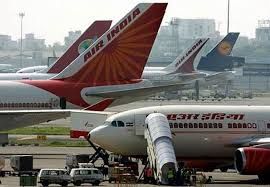 Air India has walked out of the Federation of Indian Airlines, highlighting the national carrier's discomfort on taking a stance against the government and the differences among the member carriers on policy issues.
Air India has walked out of the Federation of Indian Airlines, highlighting the national carrier's discomfort on taking a stance against the government and the differences among the member carriers on policy issues.
However, Federation of Indian Airlines will continue to function and its other members are not pulling the plug yet, industry sources said.
The association was set up in 2006 as a lobby group. Other members include GoAir, IndiGo, Jet Airways and SpiceJet.
While Air India said it was leaving the body as it prefers dealing directly with the government, aviation sources pointed out to differences among the members.
"There has been no unanimity amongst the members on various issues, including allowing foreign direct investment in airlines," said an airline source familiar with the working of the group.
Members have also been delaying payments including those of legal fees to the FIA, the source added.
An another issue over which the members disgaree is the government's 5/20 rule which disallows domestic airlines with less than five years of operations and 20
The FIA wrote to the government arguing against relaxation of the rule while GoAir (which still does not have 20 aircraft) has been seeking its relaxation.
On many such issues Air India was unable to take a clear stand, an executive from a private airline said.
This included FIA's decision to challenge the grant approvals to AirAsia India and Vistara.
The FIA has moved the Delhi High Court against the government's decision.
Other executives pointed out that the national carrier has not been actively participating in the FIA proceedings in recent months and its exit will not impact the body.
Member airlines did not respond to email queries on the subject. FIA's associate director Ujjwal Dey did not respond to text messages or take calls.
"The FIA, for the last few years, has been irrelevant and not a functional advocacy body.
"There have been too many contradictions, especially since 2008 due to conflicts between full-service and low-cost airlines.
"These conflicts continue," said Kapil Kaul of Centre for Asia Pacific Aviation.











